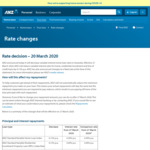ANZ 2.19% home loan fixed 2 year owner occ + 0.3% bundle rebate. LOWEST EVER BY BIG 4 BANK.
UPDATE 1/4/2020: 2.49% investor fixed 2 years. We are currently at 2-3 business day turnaround, thanks for your patience.
ANZ is the ONLY big 4 bank to pass on the emergency cut of -0.15% to variable rates
ANZ also allow a request to defer/freeze home loan repayments for up to six-months for hardship subject to approval.
Other big 4 offers: CBA/NAB/Westpac 2.29% fixed 1-3 years. Not passing on of any cuts to variable.
ANZ increased refinance rebate to $4000 for loans above $250k (must lodge by 31/5/2020)
Available under:
- Simplicity Plus: no annual fee, free redraw.
- ANZ Breakfree package, including offset account, redraw, premium credit card. Annual fee $395.
Can be split with variable 100% offset. Fixed has break costs if closed before expiry. No break costs under variable.
ANZ variable rates
Simplicity Plus
2.72% (CPR 2.76%) owner occupied P&I
3.12 (CPR 3.16%) investor P&I (approx +0.3% interest only)
Package (subject to pricing approval)
2.69% (CPR 4.30%) owner occupied P&I (Approx +0.5% interest only)
3.09% (CPR 4.37%) investor P&I (approx +0.2% interest only)
ANZ fixed rates
2.19% (CPR 3.91%) fixed 2 year owner occupied P&I
2.49% (CPR 4.53%) fixed 2 or 3 year (CPR 4.37%) investor P&I
2.69% (CPR 4.55%) fixed 2 or 3 year (CPR 4.40%) investor P&I interest only IO
PLUS ANZ bank rebate (lodge by 31/5/2020)
$4,000 loan size above $250k
Total Fees eg NSW & VIC incl GST
https://www.nswlrs.com.au/getattachment/
https://www.propertyandlandtitles.vic.gov.au/
Mortgage discharge fees $143.5 (NSW), $116.80 (VIC)
Transfer/Mortgage Registration fee $143.5 (NSW), $116.80 (VIC)
Title search $14.70 (NSW)
Legal/settlement fee from incoming lender – Approx $100-$350
Discharge admin fee from outgoing lender – Approx $250-$350
Total fees approx $650 - $800 in most cases.
PLUS 0.3% Bundle Rebate (available via Bundle Property Home Loans only)
In ADDITION to bank rebates, Bundle Home Loans gives a rebate of 0.3% of loan size (net of offset at settlement drawdown. ie balance owing) for ANY bank or product.
Why should I fix?
Given it's now obvious banks are no longer passing on any more rate cuts as predicted and cash rate is at 0.25%, a low fixed rate can still save you more money as you can get an immediate benefit from today as opposed to waiting for a drop.
Always worth doing a calculation for your situation, eg:
If you have an existing loan and your rate is 3.18%, fixing at 2.68% will save you 0.5% each year.
On a $500k loan, that is a saving of $2500 every year.
If you're saving 0.5% and go with a lender giving rebates eg Westpac $6,000 for 2 properties, plus our Bundle Rebate of $1,500, that's a further $7,500 in rebates, plus $2,500 interest savings, you are getting a benefit of $10,000 in just one year!
update We are receiving many enquires from previous deals and are replying within 2-4 days. If it's an urgent purchase or fixed expiring, pls write "URGENT" in subject or text and we will contact you ASAP. Thank you for your patience and we will reply to each and every enquiry (in case we miss one, please send me a DM).
Len
Bundle Property Home Loans
T: (02) 9698 7186
M: 0422354868
E: Loans@bundleproperty.com.au
ACL 445947
Disclaimer:
The information provided is for general education purposes only and is not intended to constitute specialist or personal advice. This has been provided without taking into account your objectives, financial situation or needs. Because of this, you should consider the appropriateness of the advice to your own situation and needs before taking any action. It should not be relied upon for the purposes of entering into any legal or financial commitments. Specific investment advice should be obtained from a suitably qualified professional before adopting any investment strategy.



They won't cut. It impacts their net interest margin too much.
I think ANZ had a higher variable to start with anyway.